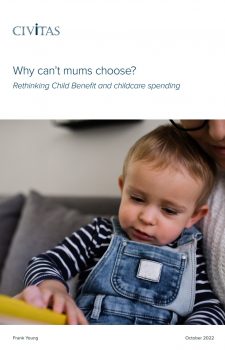Why can’t mums choose?: Rethinking Child Benefit and childcare spending
Frank Young, October 2022
British governments have been offering cash payments to families for almost 80 years. However, since the early nineties, childcare funding has been relentlessly focused on subsidising formal childcare to enable mothers to return to the workplace after childbirth.
When we ask women with young children today whether this is what they want, they tell us it is not. Two-thirds of mothers with children aged four and under would rather work fewer hours and spend more time looking after their young children.
We have calculated that there are likely to be more than 2 million working mothers of pre-school children who actively want to reduce the number of hours they work, if ‘they could afford it’.
Childcare policy in this country is the wrong way round. Getting mothers of young children into the workplace works for HM Treasury since these mothers and the nursery workers employed to look after their children will all pay tax. But it doesn’t work for the majority of mothers or, it would seem, children. More than nine in 10 mothers working part-time say they don’t want to work full-time.
According to the Institute for Fiscal Studies (IFS) think tank, there is little evidence that this benefits children’s development, particularly at a very young age, yet policy and spending is directed exclusively towards formal childcare, something recently described as a ‘Ford-ist’ approach to policy, ‘We’ll offer all sorts of help with childcare as long as you pay someone else to do it’.
We are spending more and more on subsidising formal childcare, for a small minority of mothers who might increase the number of hours they work. Policy and spending on childcare should be redirected toward mothers to give them choice.
Political parties are increasingly competing to offer ‘free’ childcare for younger and younger children, and it is unlikely to be long before every major political party ‘offers’ free universal childcare during a general election campaign.
One radical idea that is gaining support are proposals to allow parents to frontload child benefit payments, receiving more money in the first few years of a child’s life and less later on. This paper builds on these recent proposals by looking at all spending on childcare and Child Benefit to propose a new front-loaded payment to parents to give them real choice when their children are very young.
Download PDF Buy from Civitas
